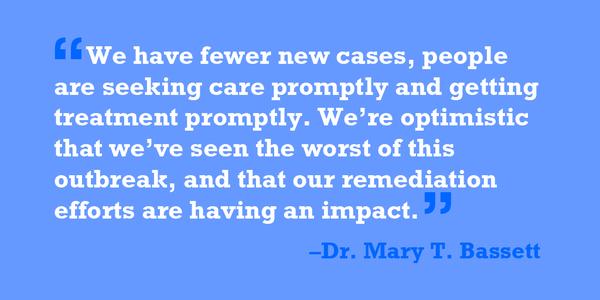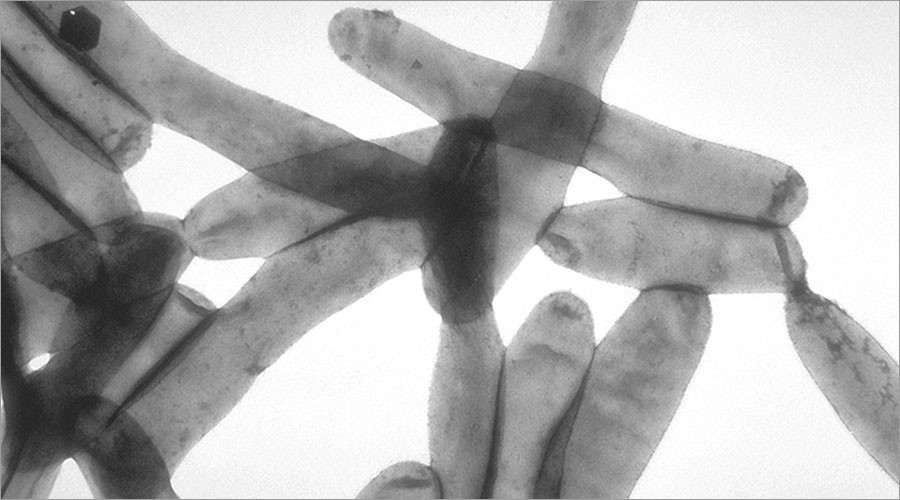
Dr. Mary Travis Bassett, commissioner of the New York City Department of Health and Mental Hygiene posted on Twitter about the Legionnaire's disease.
New York City is in the brink of a major Legionnaires' disease as ten people have been killed and more than a hundred people affected, the city health department announced.
"New York City is experiencing the worst outbreak of Legionnaires' disease in its history, with more than 100 people diagnosed in the South Bronx," Dr. Mary Travis Bassett, commissioner of the New York City Department of Health and Mental Hygiene, said Friday.
On Saturday morning, Bassett posted on her Twitter account an update on the disease. She wrote, "Update on #Legionnaires disease: Fewer new cases, people are seeking care promptly and getting treatment promptly."
Bassett added, "We now see the frequency of diagnoses decreasing, as well as the number of emergency department visits for pneumonia in the South Bronx. We have fewer new cases, people are seeking care promptly and getting treatment promptly. We're optimistic that we've seen the worst of this outbreak, and that our remediation efforts are having an impact. I thank the people of the Bronx for hearing the message and getting it out to their neighbors, friends and family. However, we must all remain vigilant. The Health Department will continue to monitor for new cases and check that building owners are continuing remediation efforts. Residents of the Bronx: it's critical that if you do develop pneumonia-like symptoms, you seek care right away."

Also on Friday night, New York City Mayor Bill de Blasio has confirmed that the number of deaths due to Legionnaires' disease has risen to ten, with more than one hundred who have contracted the disease, reported the Village Voice. De Blasio has also ordered all building managers with large cooling towers that can harbor legionella bacteria to complete disinfection by August 19. "We are doing this out of an abundance of caution," De Blasio said.
Health authorities have suspected that building cooling towers are the source of the Legionnaire bacteria called Legionella.
The incubation period of Legionnaires' disease is generally 2 to 10 days, and, rarely, up to 20 days. The attack rate is 0.1 to 5% of the general population, and 0.4 to 14% in hospitals, where patients tend to be more susceptible.
Those with Legionnaires' disease usually have fever, chills, and a cough, which may be dry or may produce sputum. Almost all with Legionnaires' experience fever, while approximately half have cough with sputum, and one third cough up blood or bloody sputum. Some patients also have muscle aches, headache, tiredness, loss of appetite, loss of coordination (ataxia), chest pain, or diarrhea and vomiting. Up to half of those with Legionnaires' have gastrointestinal symptoms, and almost half have neurological symptoms, including confusion and impaired cognition. "Relative bradycardia" may also be present, which is low or low-normal heart rate despite the presence of a fever.
Health officials said the number of cases of Legionnaire's disease in New York City have tripled over the last decade from 73 in 2004 to 225 in 2014. On the national level, the number reported cases have tripled also tripled from 2001 to 2012. The fatality rate of Legionnaire's disease is between five to 30 percent.
New York Governor Andrew Cuomo said representatives from the Centers for Disease Control and Prevention will visit the Bronx to assess the situation there, said RT.
"We are researching best practices to inform statewide regulations on the best way to prevent Legionella bacteria from forming in these systems and/or from being distributed through the air," Cuomo said in a statement.
"The CDC has done work on this topic and has research that we believe may be instructive or at least informative. We will consult the CDC and all relevant partners before issuing regulations but we do want to use this most unfortunate situation as a point of reform."
















